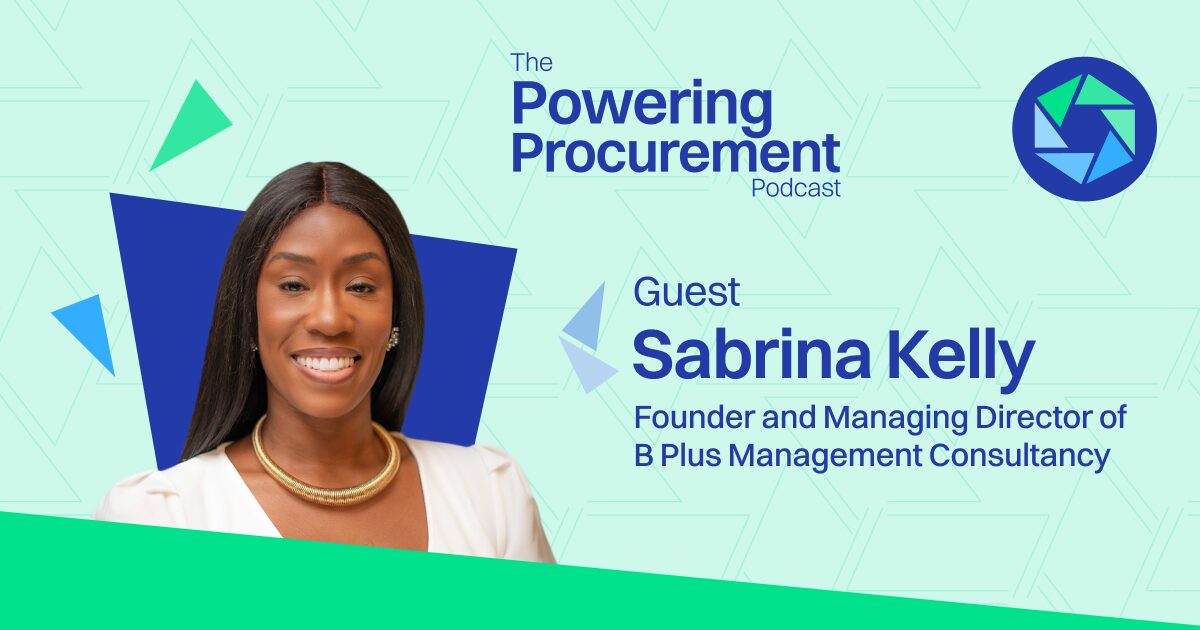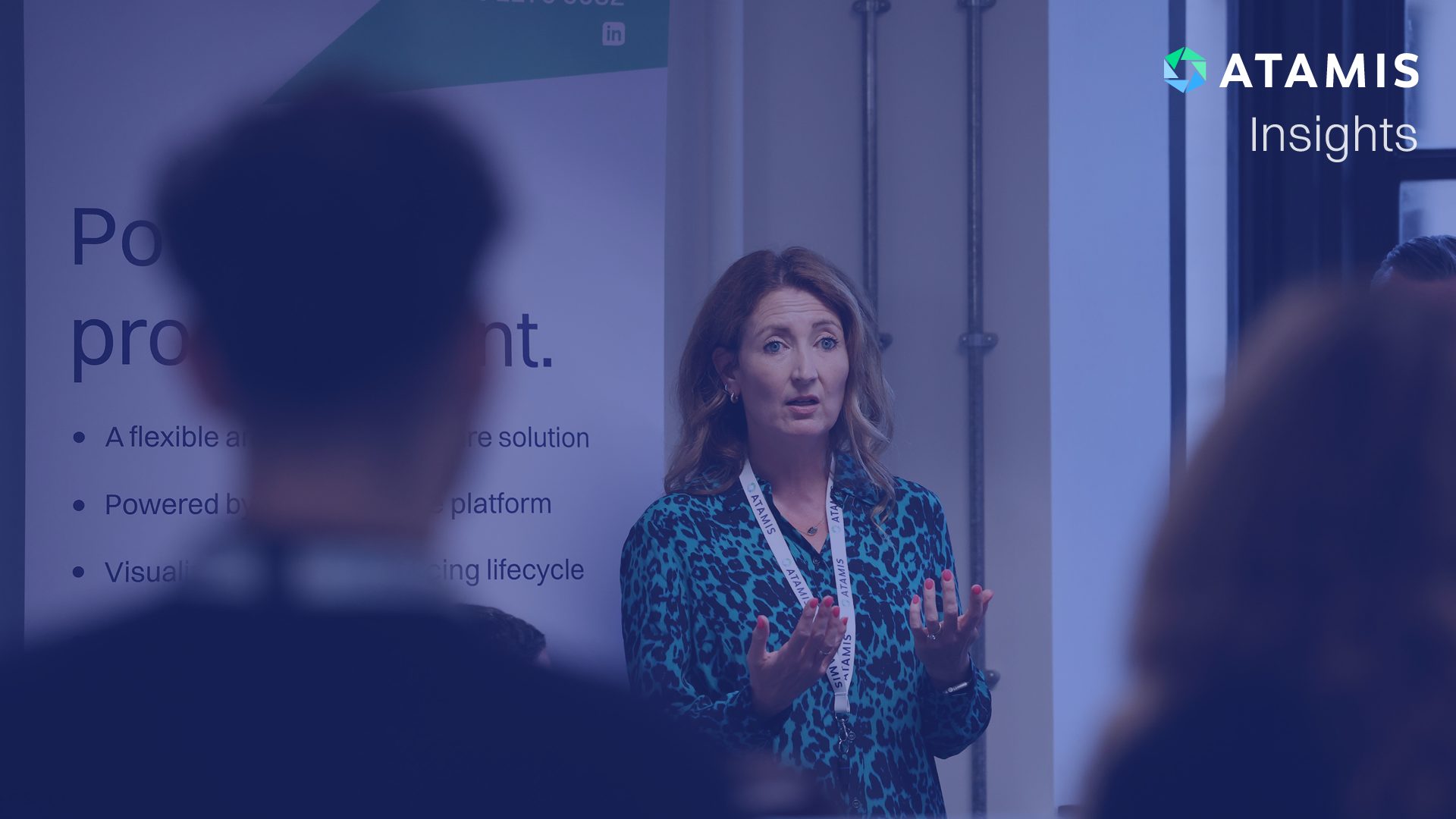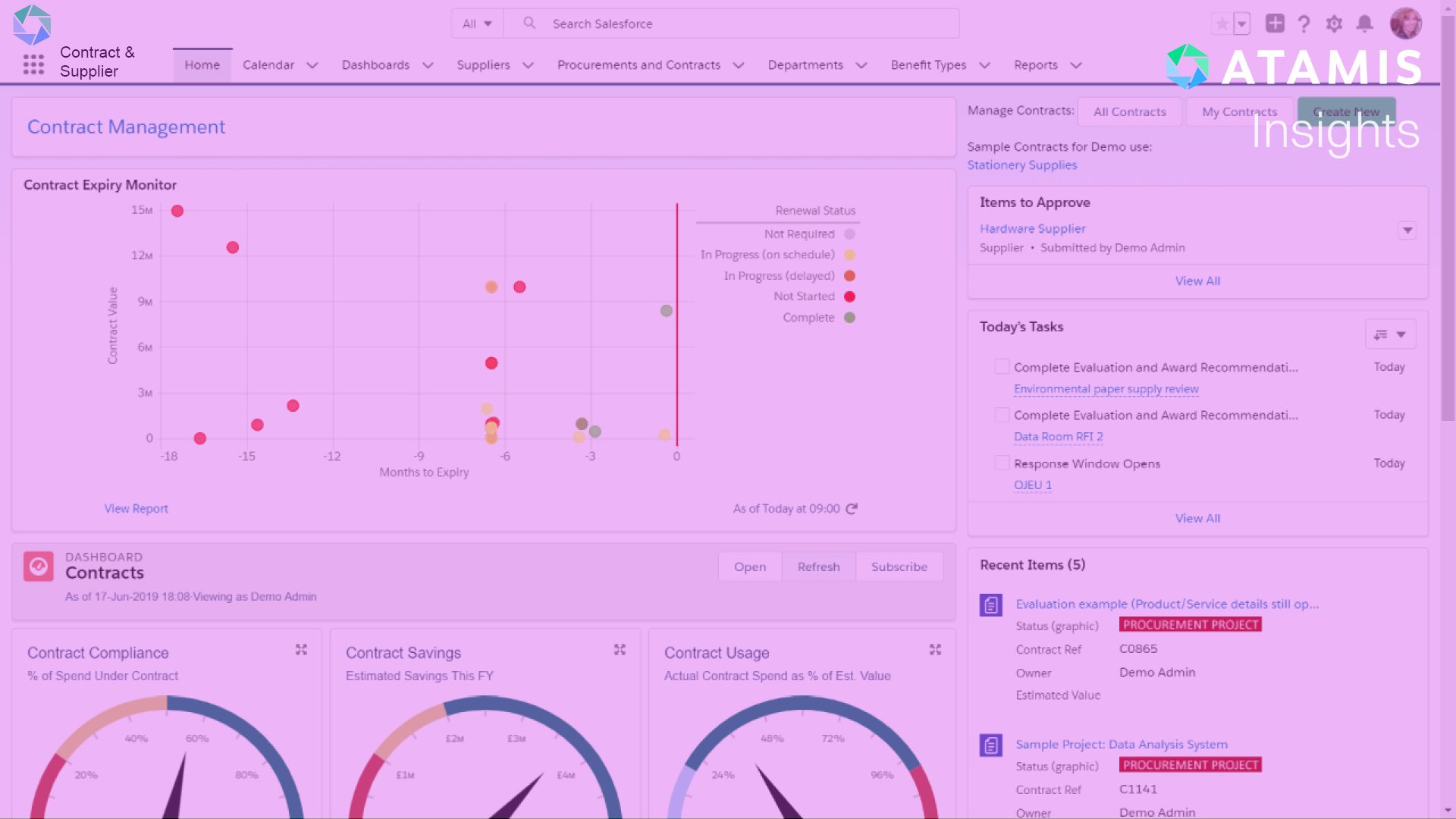“People want to be seen, people want to be heard, people want to be included, and the only way that we can do that is once we are able to create that space of diversity and inclusion.”
In this episode of Powering Procurement, hosts Sian Lloyd and Travis Crouch sit down with Sabrina Kelly, Contracts Management Specialist and Founder and Managing Director of B Plus Management Consultancy. Together, they explore the delicate balance between supplier collaboration and performance accountability, the transformative potential of AI in contract management and practical strategies for building more inclusive procurement teams.
Sabrina has worked with suppliers and corporations across public and private sectors, helping them navigate the complexities of contract performance, risk mitigation and supplier collaboration. Sabrina is also a Senior Contracts Manager for the UK Ministry of Justice, with a career spanning healthcare, energy, infrastructure, and government procurement.
If you enjoyed this episode, make sure to subscribe, rate and review on Apple Podcasts and Spotify; instructions on how to do this are here.
Find on Spotify
Find on Apple Podcasts
Watch on YouTube
Learn More
Are you looking for procurement software designed with you in mind?
Speak to our team today about transforming your procurement function.
Get a Demo
Read Full Episode Transcript
Read Full Episode Transcript
[00:00:00] Sabrina Kelly: It’s about getting the right balance and really get into the nitty gritty of what actually that key stakeholder what is it that you really want to see? And I think once you get to that point, I think it’s quite easily done. Totally. I always say you have to set the scene from the start. If you have not set the scene, if you have not done the work, the workshops, the briefings, and you are not bringing the team along, you’re not working with your key stakeholders to then go into a contract and then start, it totally it doesn’t work. Unfortunately, it doesn’t.
[00:00:31] Sian Lloyd: The Powering Procurement podcast is brought to you by Atamis, sourced to contract software designed to save you time and money. Hello, and welcome to Powering Procurement, a podcast by Atamis, where we unpack the world of procurement and supply chain management with the help of industry leaders. I’m your host, Charme Lloyd, and this is our resident expert, Gareth Birch.
[00:00:56] Gareth Burch: Hi. After twenty years in procurement, I may be billed as an expert, but believe me, I’m here to learn
[00:01:02] Sian Lloyd: too. Each episode together with our expert guests, we’ll dive into specific challenges and opportunities facing the procurement industry today.
[00:01:11] Gareth Burch: And we’ll explore easy wins and longer term strategies to help you rise to the challenge of driving value through your work while showcasing the power of procurement.
[00:01:22] Sian Lloyd: So let’s get going. Welcome to Powering Procurement. Now today, we’re changing it up a bit because my usual cohost, Gareth, is away, but I’m delighted to say that keeping his seat warm is Travis Crouch. And Travis is a perfect cohost because he’s been a guest on Powering Procurement, and he’s now also part of the Atamis team. So really looking forward to working with you on this. But let’s introduce our main guest for this episode, and we are thrilled to be joined by Sabrina Kelly, an industry leader in contract management and supplier relationship strategy. Now as the founder and managing director of b plus management consultancy, Sabrina has worked with suppliers and corporates across public and private sectors, helping them navigate the complexities of contract performance, risk management, and supplier collaboration. She’s also a senior contracts manager with the UK Ministry of Justice and has a career spanning health care, energy, infrastructure, and government procurement.
[00:02:29] Travis Crouch: Sabrina’s expertise goes beyond contracts. She’s passionate advocate for mentorship, diversity, and driving transformation change in procurement. Today, we’ll dive into her journey. The evolving role of contract management and our procurement professionals can leverage technology, supplier partnerships, strategic frameworks to make a real impact. Sabrina, welcome to the podcast.
[00:02:50] Sabrina Kelly: Thank you. Thank you for having me.
[00:02:53] Sian Lloyd: We are really looking forward to chatting with you. And, I guess to start, it’s a question that we normally ask all of our guests on the podcast, which is to go back to the beginning, really, and to share with us why they began in procurement. You know, what drew you into that sector?
[00:03:11] Sabrina Kelly: Quite interesting you you asked that question, Sean, because I’m originally from The Midlands, from Birmingham. And my first job was with Birmingham City Council, which is the largest local authority in Europe, as you may or may not know. And I remember my first role was as an assistant housing officer. And I worked in the housing division, which meant that I had the opportunity to work in a number of different functions and really explore and really get to understand about housing management and housing maintenance. Um, but one thing I really picked up quite quickly is I really enjoyed that kind of working with the suppliers and the contractors, you know, when we were talking about upgrading properties or decent homes or, you know, a refurbishment of an estate was something that I’ve really thrived in. So it was something that I noticed quite quickly that I really enjoyed that supply relationship aspect of things. And as I continued my career in Birmingham, I I remember going for my first management job. And at the time, I was 25, and I was successful. I well, you know, he told me, you you’ve been appointed. We’d like to appoint you. And I was, like, so overwhelmed. I was shaking. Like, really me? And at the time, I was, like, the youngest black female leader for housing management, which was was just an amazing accomplishment. But what that also did was it allowed me to then kind of take it up a notch. So I was managing regeneration programs. I was managing the out of hours management for the whole of Birmingham. And so that, again, exposure to the contracts, managing contractors, suppliers, that really got me to a place where, oh, this is really what I want to do. And then as time went on, I, you know, grew and went on this journey of my career moving into the contract and performance management kind of space because that’s what I really enjoyed and worked with health care, pharmaceutical, public, government, local government, and also having that exposure exposure of not just local and national, but they’re now going to global. And then b plus was born. I recognized quite quickly that although these supplies and contractors were winning contracts, which was fantastic. It was great. They’ve gone through all that procurement process, the tendering. It was like, okay. We’ve won it now. Here’s the contract. What do we do? And so I was noticing quite quickly that, actually, a lot of the contracts were fading. And sometimes it would be something quite quite significant that needed to change behaviors or really understanding what’s the schedules, what’s the legal aspects, who our key stakeholders are. And that’s when, like I said, b plus was born, um, and that then pretty much helped in terms of looking at training, providing training to suppliers and contractors and and service providers and working with organizations that had new suppliers that were coming on. So, yes, it’s been a journey, and and that’s how we got there.
[00:06:18] Sian Lloyd: Well, thank you so much for sharing the story with us, and huge congratulations. You know, what you did at a really young age, it truly is inspiring, and it’s it’s great to hear about. And then, obviously, to get to going through to founding your own company as well. It’d be interesting to understand a little bit about how you think the the profession has has evolved over time. And I suppose you’ve alluded a little bit to it when you were referring to the fact of of why you did set up and and found your company, but great to hear a bit more about that, about how you think it’s evolved. Yeah. I I definitely think it’s evolved somewhat. And how I’ve seen that,
[00:06:57] Sabrina Kelly: I think now people or I should say now organizations are saying, okay. Two parties are signing for a contract, but what is the value that we’re getting out of this contract? That’s pretty much what people want to see. So where before I think you would probably have two companies sign a contract. Okay. We’re in this two years, five years. And maybe there was a bit of coasting or not real understanding, so we can get away with it. We’re gonna get paid. What I’m seeing more now is the emphasis on, okay, we’ve signed for a contract. But as the client, what we want to see is what are you gonna do above and beyond? What is the added value you’re going to bring to the organization? And so that emphasis is is very clear now where organizations are having or suppliers are having to demonstrate that added value. They’re having to demonstrate what’s the above and beyond that they’re going to do outside of the contract value. And so it’s not just about, okay, we’re paying for you know, it’s an exchange, but we want more of that innovation. We want more of that creativity within that space. And how are you going to do that? So I think guiding suppliers and saying, okay, guys. Let’s look at this. What more can you do for the client? How are we gonna demonstrate that? How are we gonna report that? I think that is something that’s really been quite big in terms of that change.
[00:08:17] Sian Lloyd: Yeah. That’s a really interesting perspective.
[00:08:19] Travis Crouch: Sabrina, I think for me, what what would be really interesting is to hear your perspective on what are the what are the common things that suppliers kind of you know, the block is that struggle from them to actually kind of help release some of that innovation? What are the things that you see kinda getting in the way?
[00:08:35] Sabrina Kelly: I think sometimes it’s about really understanding the business. I think if you go into an organization and not really understand the business, I think that can be a blockage. So, you know, if you’re working for, for example, you know, a pharmaceutical company or you’re working for facilities, really understanding the business and how you can be innovative within that business, I think sometimes that’s where organizations struggle. And it’s really interesting because there’s so much that can be done. I’ve seen so many creative, innovative ideas where, you know, people have and I’m like, wow. That’s amazing. And I think it’s just about getting the right people, a, the right people around the table. And I think, you know, getting the right people around the table can help to unblock that. I think having that diverse number of people around the table, again, will help to unblock that. So I think that’s that, again, is really, really key and really important.
[00:09:33] Sian Lloyd: And just how far do you think, really, procurement can go if if you do get that right? I mean, perhaps in terms of, you know, broader organizational objectives being achieved, you were saying it’s really important that that the teams understand the business, but we’ve got objectives like sustainability now, haven’t we, risk management, and operational efficiency as well.
[00:09:56] Sabrina Kelly: I think all of that happens precontract. Those conversations have to take place precontract. So I think that’s where procurement come coming quite strongly is having the conversations with the suppliers, with the managed service providers, and saying, actually, this is where we’re at in terms of these objectives. This is what we’re looking for you to deliver and getting that agreement beforehand. And that’s when you then were pulling the SMA, you know, of sustainability to help to guide those conversations to define what that looks like. And I think, you know, I think once that’s in place, I think I think it can work quite well. I mean, when we talk about risk, risk is everybody’s problem. It’s everybody’s issues. It should be on the full forefront of everybody’s mind. So I think, again, that it’s not just, oh, it sits with the operational team or the team that’s delivering this program or this contract or the contract management. It’s everybody, and everybody should have an awareness that everyone should be really kind of focused on, okay, if there is a risk, what do we do? How do we go about that?
[00:11:02] Sian Lloyd: Well, Sabrina, your career has been really varied. You’ve worked with health care, corporate organizations, uh, managing complex supplier contracts. And one of the biggest challenges, certainly, it’s it’s what we’ve heard about in some of our previous podcasts as well, is actually ensuring that those supplier relationships remain strong whilst also holding them accountable for performance. So it’d be really interesting to get your thoughts on this, you know, and any advice, really, for procurement leaders in terms of getting that balance right between collaboration and performance enforcement? You know, what are the tips or advice that you could give there?
[00:11:43] Sabrina Kelly: That question I’m asked that question all the time. I was presenting a briefing to a team, and someone said, oh my god. How do you do it? Oh, how? How? And and, like, well, how do you get the balance? And it definitely comes with years of experience. You know? I’m not gonna say it doesn’t. It comes with years of experience. But I think what’s really, really crucial with any relationship, okay, professional, personal, It’s about setting expectations. Right? We all have expectations. And I think it’s important from the offset that both parties are very clear about what the expectation is. And I think if both parties are very clear so when I say clear and setting expectations, we talk about, okay, setting a communication strategy, um, a communication charter. What do we do if we’re in dispute? What does an escalation process look like? Does that mean that we go straight to the director, or do we go to the head of? Or is it the partner that we go to first? Or is it something we have to call the VP and at what stage? And I think when once that is kind of defined and agreed, that means both parties are agreeing and they’re signing to that, which then means that if things are to happen, if, for example, there is a dispute or there is an, um, an underperformance issue that needs to be picked up, we refer to what both parties have signed up to, which is the escalation, you know, that escalation process or, you know, the charter. And I think that is how we that’s that’s how we balance that relationship. I always say building relationships is so key. Being able to build the relationships with your key stakeholders and defining that is is paramount, and that will help you in terms of delivering success con successful contracts. So that’s definitely that that’s my advice, and that’s my guide. And and it’s worked. And it does work. You know, when I’m delivering workshops, that’s something that, you know, I definitely emphasize on is building those key stakeholders.
[00:13:50] Travis Crouch: Sabrina, one of the things I’ve kinda seen throughout my procurement career is lots of variations of service levels, KPIs, service credit regimes, etcetera. How do you how should contracting authorities, in particular, strike a balance around kind of making sure that what they’re putting into their contracts will return value from their suppliers?
[00:14:14] Sabrina Kelly: It’s It’s quite interesting when you talk about KPIs and measuring metrics, etcetera. I’ve worked on contracts that that have had over 3,000 obligations. Okay? Are we gonna report on 3,000 obligations? That’s a mammoth task. Impossible. But I think it’s about getting that balance, and I think it’s also about ensuring that people really understand. Okay. What is it that you really want to see in terms of the key performance of the contract and for them to agree on that? You know, there’s been times I’ve been in meetings where people are saying we want to report on 50. Now 50 metrics to report on, what is the value? What are you trying to get to? And I think if if you have conversations and discussions with those the wider group or the wider key decision makers, you’ll find that actually, in fact, it’s not that they want to report on 50. It’s the fact that, really, they just want to make sure that the contract is being delivered. It’s being delivered to the scope and the cost of the contract. They want to feel comfortable and confident and have that assurance. And, actually, in fact, we only need five, or we only need six because we know that, actually, that’s going to demonstrate that. So I think there is a balance. It’s about getting the right balance and really get into the nitty gritty of what actually that key stakeholder what is it that you really want to see? And I think once you get to that point, I think it’s quite easily done.
[00:15:37] Sian Lloyd: In in that work really early, doesn’t it?
[00:15:40] Sabrina Kelly: Totally. I always say you have to set the scene from the start. If you have not set the scene, if you have not done the work, the workshops, the briefings, and you are not bringing the team along, you’re not working with your key stakeholders, to then go into a contract and then start it totally it doesn’t work. Unfortunately, it doesn’t.
[00:16:01] Travis Crouch: Yeah. And I can definitely stand behind that. Other times I’ve kind of been at the end when you’re kind of looking for generic KPIs, things that have been used in other contracts, and you kind of go, I just need something something to start from. It’s quite easy to get stuck in that and actually not do put the effort in to actually make sure that the they are relevant to the the service that’s being provided.
[00:16:21] Sian Lloyd: Definitely. Really interesting conversation there and really useful as well. Thank you both. If we turn to AI now and, uh, digital transformation, again, something, obviously, that we’re talking about a lot in this sphere at the moment. Sabrina, what most excites you about the role of AI and digital tools and procurement and contract management? What are the the possibilities, or what’s happening that excites you? Well, I’ve got to say, I take my hat off for anybody
[00:16:49] Sabrina Kelly: that works in technology. I just think kudos. They’re amazing people, like, honestly. I I think that’s, like, how many years ago, like, literally going to Wells with my mom and using an a to zed. And remember, we used to plot. Like, you used to write it down before you got in the car. Showing my age now. And look at where we are now. We have Google Maps. We have Waze, and it’s just so much easier. You put the postcode and you get there. So for me, technology is huge, and it’s it’s a great welcomed benefit for me where I see it. But when we talk about procurement and we talk about contract management, I think there is so much scope within that remit in terms of what can be done. And I was reading an article in the forms, and it was talking about a software that will be able to read contract management documents and review them for accuracy. And I thought, wow. That’s huge. Because when I think about some of the contracts that I’ve dealt with, they’ve been this thick. Okay? You’ve got to get through them, understand the schedule, the clauses, the annexes, and pull out all the relevant. And to think that there is this software or there will be this software is is huge. So I think it’ll be interesting to see what will happen in that space. I think it’ll be interesting to see people’s responses to that. I think we’ll struggle when it comes to, okay, we have a monthly meeting with our supplier, client and supplier. Okay. Is AI going to do that? I think we’ll struggle in that respect because I think that human interaction is still going to be needed. It’s still going to be required for those discussions. But I think in the in terms of the contract, the legal side of things, I I see that quite exciting.
[00:18:35] Travis Crouch: Sabrina, a question for me on that. So do you ever have conversations with, you know, the the contractor base around using AI and technologies and responding to bits and tenders? Because I know that, you know, that’s out. There’s tools out there already that do that, and they kind of, you know, automatic reply. They go back to question and answer banks, and they customize the responses. Now do you do you see that? Do you get have any insights into that?
[00:19:02] Sabrina Kelly: I haven’t seen much of that in the organizations that I’ve worked with. I think it’s still at the early stages, and I think just like everybody, everybody’s a little bit like, will it work? If we do do we do a phase? Do we do a pilot? Do we only do a certain part of the organization? If we do bring it in, shall we do a trial? And I think there’s it’s still early stages what I’ve seen across the organizations that I’ve worked with. So, yeah, I think it’ll be interesting to see what that looks like and feels like.
[00:19:29] Sian Lloyd: And great to hear you talk about your holidays in Wales in the past. A to zed. When I started out my career in journalism, we literally would be having to get the a to zed out to find out which farm I was going to be interviewing a farmer in, you know, some 20 miles away, whatever, and then phone in the copy from a phone box. So things have literally
[00:19:50] Sabrina Kelly: Really changed.
[00:19:52] Sian Lloyd: Over the past few decades. Well, you know, it it’s it’s progress. You know, we we talk about making progress, don’t we, in in lots of different ways. But do you foresee, at this stage, potential challenges?
[00:20:04] Sabrina Kelly: I think with change, you’re always gonna get challenges. If you have a team of people and then you’re going to say, actually, in fact, we’re going to be in introducing AI, that is going to come with some resistance. That’s gonna come with some fear. Because the first thing people are gonna be thinking is, oh my gosh. They’re going to take my job. I’m not going to have a job. And so I think that is where organizations really need to be sensitive. They have to bring people along this journey, and how they do that again is really, really important. So I I do think there’s going to be challenges because, you know, you’re talking about people thinking, my job’s going to go. You know? I’ll have no job. But I think it’s about how you position it. I think it’s also about, you know, in terms of that engagement. People want to feel like they’re a part of any change that’s going to be implemented. They want to feel consulted. They want to feel engaged. And I think if you can get the balance right, you you’re gonna get a few, but I think it will help. It definitely will help.
[00:21:07] Sian Lloyd: Yeah. And and do you think that the sort of the the skills that people need to equip themselves with might need might need to change as well?
[00:21:14] Sabrina Kelly: Possibility. I I definitely think, you know, it might look different. You know, their job description that they may have had for twenty years may look different to what that looks like going forward. And so, you know, again, that mindset, you know, are people ready to change? Do they want to change? You’ve got some people that actually, in fact, you know, they probably only got five years left, um, working life. You know? Are they really like some may be like, oh, that’s not for me. And and so that that’s where I talk about getting the balance right as you go on this journey of change and how you engage and consult and and making sure you have the right people for those roles.
[00:21:53] Sian Lloyd: And I guess moving on from that, I I know that you are very much involved as a mentor as well, aren’t you? And and you’re certainly a passionate advocate for inclusion, for also supporting and encouraging more diverse talent into the sector. So, you know, it’d be great to hear a bit more about that. It’s obviously, you know, you care a lot about people from what you’ve been saying already. That certainly and your passion for that has has shone through. So in terms of, you know, organizations making themselves more inclusive and certainly, you know, within the whole sector, really, supply chains, procurement teams, You know, what what can people what can organizations be doing? What should they be doing?
[00:22:40] Sabrina Kelly: That is such a good question. It’s and it’s it’s really good to be having these conversations. This is positive. I think from, obviously, my experience in working with organizations and designing, mentoring programs, etcetera, people want to be seen. People want to be heard. People want to be included. And the only way that we can do that is once we are able to create that space of diversity and inclusion. And whether that is, like I’ve said, you know, mentoring programs, whether that is recruitment boards, making sure that there is a, you know, a good representation on that those boards, that’s important too. And I think about, you know, people that I’ve mentored or programs where I’ve delivered. And years later, you know, I’m getting emails to say, Sabrina, thank you so much. Because, actually, the session that you delivered helped me to do this, and it gave me the confidence to apply for that job because I didn’t think I could or I didn’t think I was good enough. And I think organizations really need to take the approach quite with their arms around it, like, literally, not just this light touch or because it looks good or it feels good, but actually, really embrace it. Really embrace that, actually, we want to make a difference. We want to make sure that our workforce is diverse and it is inclusive. And what does that look like? Who do we need to talk to? Which groups do we need to talk to? Who do we need to get on our board? And it’s those kind of actions that need to happen to make the change.
[00:24:20] Sian Lloyd: And do you think people understand, you know, the benefit that will bring?
[00:24:24] Sabrina Kelly: I think some organizations do it very well, and I think some organizations are still learning. And I think they’re still on a journey. And I think, you know, it’s a space where sometimes you have to have some honest conversations. And that sometimes leads to, you know, leadership being coached. And for them to really understand, okay, what is it that we’re trying to do here? What’s the vision? Because it always starts from the top. Let let’s be honest. Mhmm. And you have to be open. There has to be a level of openness as well for that chain. So I think, you know, some organizations do it really well, and we should be looking at those organizations who are, you know, pioneers of that, but we have some organizations that still are on a journey of growth and development.
[00:25:10] Sian Lloyd: It’s just a sort of off the cuff question just thinking as you were speaking there. I mean, have you ever been mentored? I mean, I’m certainly, you know, have I’ve been a mentor, and I’ve been mentored, and I found that really, really valuable. And I was just interested. I know that you do mentor others, but whether you’ve been a mentee ever.
[00:25:29] Sabrina Kelly: Yes. I have been a mentee, and I remember my first mentor, actually. Um, it was actually in the housing department. And I remember seeing this lady, and I just thought, oh my god. She’s phenomenal. Like, she’s phenomenal. She looks like me. And I identify with her, and we had a conversation. I remember her giving me her card, and she said, if you need anything, I’m here. And, you know, I emailed her straight away, like, literally. And she was so fundamental in in my my journey, my career. The responsibility and the accountability lied with me. I was responsible for my actions. I was responsible in terms of getting things done if I wanted to progress or I wanted to change things. That’s what I was responsible for. She was coaching me and mentoring me through. And, yeah, it was a fantastic experience, and I would I’m an advocate. So that’s what my business does. So, yeah, advocate for it.
[00:26:25] Sian Lloyd: Well, Sabrina, one of the the biggest challenges in procurement today, certainly something we’ve been talking about quite a bit over the past months, is aligning contract management and supplier relationships with, well, really ambitious ESG, environmental, social, and governance goals, producing scope three emissions, social value. Where do you fit in on all of this? You know, what sort of work do you carry out with SMEs to make sure that they are delivering in this sphere?
[00:26:56] Sabrina Kelly: Again, another good question. Because when we talk about social value commitment, social value commitments are normally agreed pre contract. And so it’s agreed by both parties. Both parties have signed up to it, and then it’s included. Okay? And then it’s now, okay, we have to deliver. And what I’ve noticed over my time is really that understanding of what that social value commitment should look like. That is where the challenge is. The challenge is really understanding how do we demonstrate that to the client, what does that look like, how are we going to report it. And I think when you talk about carbon emissions, etcetera, you do have to have an understanding of that. Um, there has to be an understanding. I mean, even with, you know, the government changing, etcetera, one of the things the first thing of the first things I did was, you know, I arranged a meeting with our SME, who was a sustainability lead, who then helped to have that conversation, the discussion with the supplier for us to really understand, okay, what does that mean for us? What does it mean for the reporting? Do we need to change anything now? Are we still just waiting to see? And I think having the understanding is really, understanding is really, really important, and that is where I have been. And my organization’s been able to come in and really just get to the the detail, to the nitty gritty of, okay, what are we trying to do here? How are we going to report it? How are we going to demonstrate that we’re compliant and and demonstrate that to the client? So, again, big social value is is is big on the agenda.
[00:28:36] Travis Crouch: Sabrina, what are the smaller changes that you think clients need to make? Like, kind of thinking about things like, you know, when social value, the things that they should be doing, the things that should should be contract concentrating on, and then also particularly around some of the emissions, like, what are the things they should start tracking? So it’s just kind of some of the advice you’d give to some of those contractors so that they could help, you know, be compliant with the requirements that contracting authorities would
[00:29:04] Sabrina Kelly: I think it’s really important for, you know, when we’re talking about SMEs that they really have to understand what the vision and the strategies of the organization that they’re working for and working with. I think that is really, really key. I think if they have that understanding, they will then understand what it is what is required for them to be reporting on. Um, and so I think when that understanding is in place because every organization’s different, you know, in terms of that social value commitment and what they’re looking for and what they’re reporting on. So it’s really important that they understand that specific organization that they’re working with, that specific contract is going to be different to the other company. And so you can’t use the same reporting or it might look different because the client might want something a little bit different. And so I think, again, it’s about that understanding of, okay, what does that social value look like? How am I going to demonstrate that to the client? What does the reporting look like? And I think that’s where it comes it comes in in terms of that understanding.
[00:30:07] Travis Crouch: Exactly what I was thinking hoping you would say because I think that’s, you know, it’s not one one size fits all approach. Yeah.
[00:30:13] Sabrina Kelly: It’s definitely not. I’ve had conversations with people where they’ve said, oh, we’ve done it like that in that organization. And I’m like, okay. That’s that organization, but here, this is the way that they do it. So, actually, in fact, let’s do it the way that they would like to see. And I think that mindset understanding that is really, really important.
[00:30:32] Sian Lloyd: Because, Travis, it’s a it’s a big period of change, really, for for everybody involved, isn’t it, being affected by the procurement act changes? Well, our final question, Sabrina, it’s one that we ask all of our guests. We asked it to you, didn’t we, Travis? I think right at the beginning of the series. You know, recognizing that when we launched the podcast series, it was our mission really to put the sector in the spotlight. Um, we don’t need to tell you that recruitment is challenging in a number of sectors, procurement included and, of course, retention. So this is an opportunity to shine that light and to hear from you why you’re happy that you chose a career in procurement and hopefully inspired the next generation to do so too.
[00:31:17] Sabrina Kelly: I absolutely love what I do. And I’m quite fortunate to say that I love my job, that I love what I do. Working within procurement and contract contracts management has definitely has had the ability to shape the way that I lead, shape the way that I think. It has given me so much exposure in terms of the different organizations I’ve worked for, from local, national, globally. And that for me is fantastic. And I’m and I’d always advise people that there’s so many different areas of procurement you can explore. Explore those roles. Yeah? Because you don’t know which one’s going to be the right fit until you explore them. So whether, you know, you have supply relationship management, you’ve got a buyer, you have procurement procurement officers, managers. You’ve got category managers. You’ve got contract manager. And the list goes on. So it’s about finding the right fit for you and to explore those areas. And I think that for me is the reason why I fell in love with being and doing the contract management expertise and specialisms that I specialize in because I realized that was something that I really loved and it was my strengths. You know? I love working with people and, you know, having conversations and seeing contracts succeed is is what I want. It’s what I want to see.
[00:32:44] Sian Lloyd: Thank you, Sabrina. It’s been an absolute pleasure chatting with you today. Uh, that passion has certainly shone through. Thank you for being our guest on the Powering Procurement podcast.
[00:32:54] Sabrina Kelly: Thank you for having me. Thank you so much.
[00:32:56] Travis Crouch: Thanks, Sabrina.
[00:32:57] Sian Lloyd: The Powering Procurement podcast is brought to you by Atamis, source to contract software designed to save you time and money. Choose the apps you need from pipeline and tender management to supplier and contract management. Get the tools to power up your procurement. Visit atamis.co.uk to learn more.
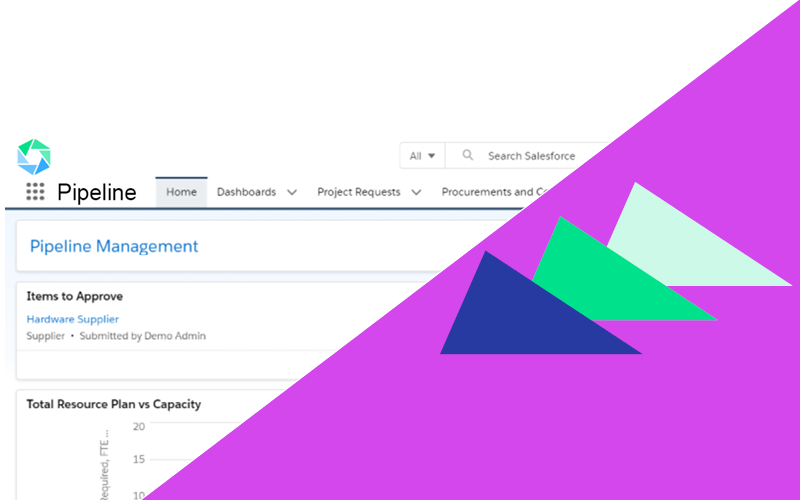 Our Pipeline App empowers your team to plan ahead and forecast for upcoming procurement activities.
Our Pipeline App empowers your team to plan ahead and forecast for upcoming procurement activities. 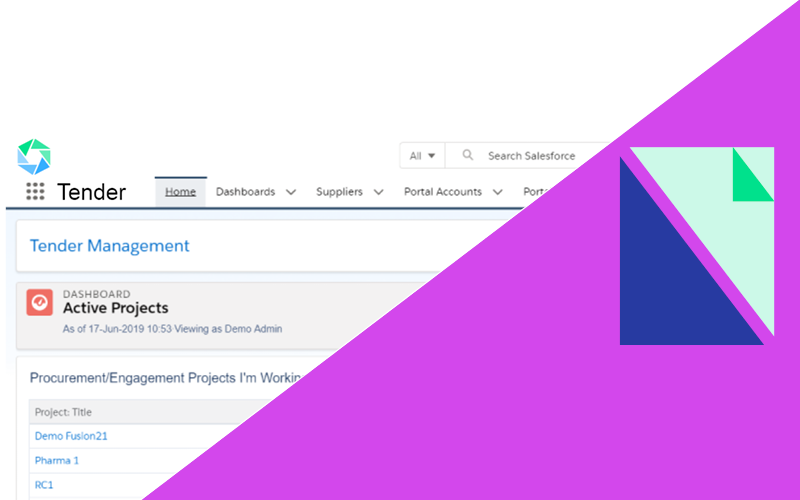 The Tender App allows your team to visualise all sourcing activities within your Atamis platform, from issuing tenders to receiving bids.
The Tender App allows your team to visualise all sourcing activities within your Atamis platform, from issuing tenders to receiving bids.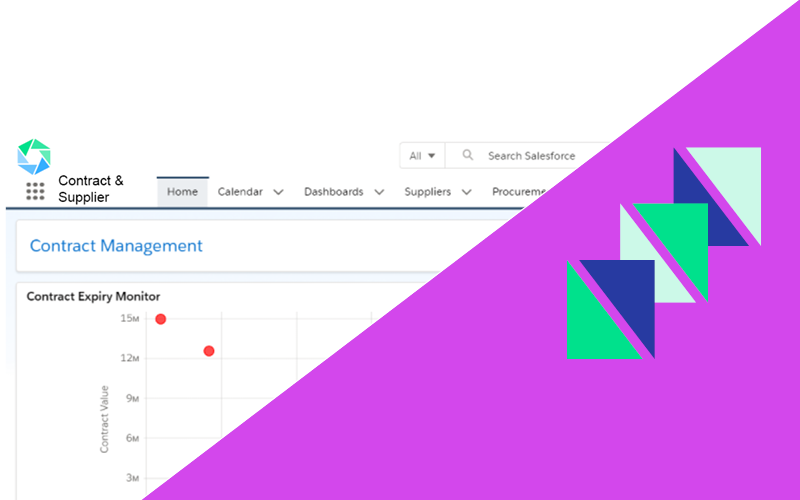 Our Contract & Supplier App puts your team in firm control of your key supplier relationships and provides a central repository for all contracts.
Our Contract & Supplier App puts your team in firm control of your key supplier relationships and provides a central repository for all contracts. 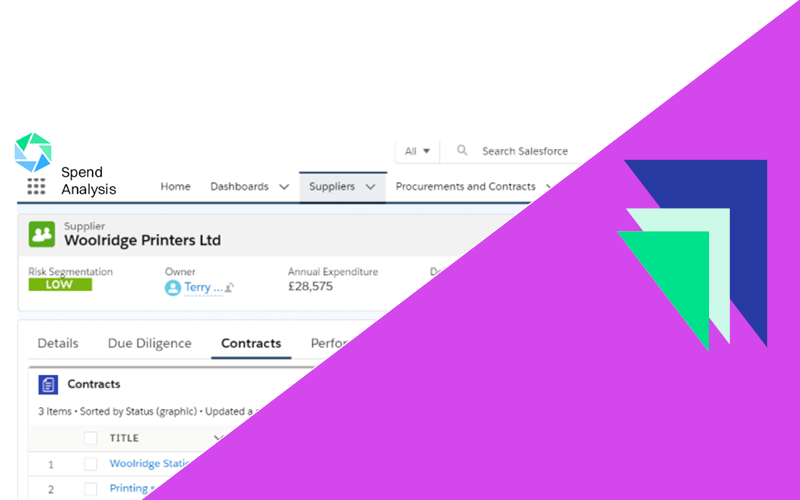 Our Enhancers ensure your solution is tailored to your needs. Pick and choose additional functionality that fits your requirements.
Our Enhancers ensure your solution is tailored to your needs. Pick and choose additional functionality that fits your requirements. 